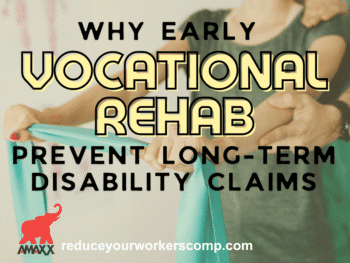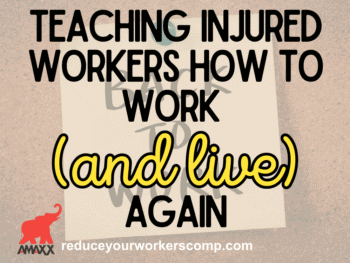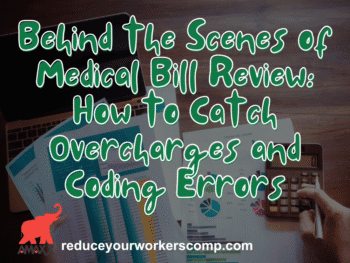Top 10 Obese States
While reading through my local paper the other day, I came across an article of the most obese states in the USA. They are ranked as follows:
- Mississippi
- Louisiana
- West Virginia
- Alabama
- Michigan
- Oklahoma
- Arkansas
- Indiana
- South Carolina
- Kentucky
The comorbidities of obesity are obviously well known, including diabetes, high blood pressure, sleep apnea, arthritis, and more. But how does this play in to work comp cases?
Top Culprit Moves From Aging to Obesity
In the not too distant past, aging was seen as the biggest culprit to a spike in cases. These workers possibly were on the edge of retirement, now remaining in the workforce because their 401k tanked, their house lost value and was unable to sell, and so on. Workers in the retirement age were unfairly viewed as resistant to new change, resistant to new technology, and resistant to retire. In addition to all of that, their bodies are riddled with both possibly occupational and certain non-occupational damage. Should an injury occur, the adjuster viewed them as looking for a way to fund their retirement by milking work comp wage loss and medical benefits until they finally filed for their pension. After that they left the occupational scene in a flurry of litigation looking for high-dollar redemption in exchange for their years of pain and suffering while working for their employer. (WCx)
This blanket statement is no longer the top culprit amongst claims professionals. Obesity has taken over as the top non-occupational factor that leads to adjuster headaches. While not entirely true in every case, the majority of obese individuals come with their own medical baggage, in the form of longer healing times, degenerative arthritic issues, diabetes, and the like.
Biggest Medical Issue Non-Occupational Degenerative Condition in Joints
The biggest medical issue that comes with obesity are the non-occupational degenerative conditions, mostly seen within joints. Obese workers may have more wear and tear in their ankles, knees, hips, back, and shoulders, and any injury in this area that is acute in nature will be affected be underlying degenerative arthritis that is exacerbated or accelerated by the mechanism of injury.
Difficult to Determine What is Pre-Existing
This makes the case difficult for the adjuster, who is trying to weed out what damage is occupational in nature, and what is not. Even if this worker has no prior record of treatment, the mere existence of arthritis in these joints will complicate any case, extending healing times due to more extensive surgeries. Workers are confused why their claims are denied due to arthritis, when they have never had any treatment for this condition before. Typically, they do have reason to complain because the adjuster doesn’t take the time to explain to the claimant why their doctor said that some of their injury is work related, and some of it is not.
Costs Can Skyrocket During Investigation and Litigation
In these situations, the cost of the accrued benefits can continue to climb. Adjusters will perform an extensive medical background sweep looking for prior medical treatment, even if the claimant states they have never treated for this pain before. As anyone in the field knows, this will take time. And while this investigation is ongoing wage loss continues, medical expenses climb, and litigation will usually result. Then when that litigation happens, it will move slowly from one court date to the next, adding attorney expenses to the overall cost of the claim.
Every case, however, for an obese worker is not denied. I have seen cases where the worker’s MRI of their knee looks clean, absent of any arthritic condition except for the meniscus tear that the work injury caused. Everyone heals differently. I have seen cases where a worker labeled “obese” has had a quicker turnaround time from injury to return to work post-surgery than someone not only non-obese, but years younger as well. I credit this to overall personal attitude, genetics, and the dedication to listening to what the doctors and physical therapists are telling them to avoid and what to do instead. Using proper body mechanics and lifting mechanisms help as well, providing a way for a worker post-surgery to return to gainful employment while on restriction, which gets them up and around and off the couch. (WCx)
Every Case is Unique
Just because a worker is labeled obese by their physician or by the new media standards, doesn’t mean their claim is doomed, or at least in certain denial. It is true that the claim may take more investigation, especially on the medical record end, but when it is all said and done some cases are denied, and some are accepted. No two cases are exactly the same. The adjuster has to take the time to explain to the claimant what they need to do, and what records they need to help produce for the adjuster. If everyone gets on the same page and does what they are supposed to do, then the claim will work itself out, whether it is indeed denied, or accepted as compensable.
Author Rebecca Shafer, JD, President of Amaxx Risk Solutions, Inc. is a national expert in the field of workers compensation. She is a writer, speaker, and publisher. Her expertise is working with employers to reduce workers compensation costs, and her clients include airlines, healthcare, printing/publishing, pharmaceuticals, retail, hospitality, and manufacturing. She is the author of the #1 selling book on cost containment, Workers Compensation Management Program: Reduce Costs 20% to 50%. Contact: RShafer@ReduceYourWorkersComp.com.
Editor Michael B. Stack, CPA, Director of Operations, Amaxx Risk Solutions, Inc. is an expert in employer communication systems and part of the Amaxx team helping companies reduce their workers compensation costs by 20% to 50%. He is a writer, speaker, and website publisher. www.reduceyourworkerscomp.com. Contact: mstack@reduceyourworkerscomp.com.
WORKERS COMP MANAGEMENT MANUAL: www.WCManual.com
Do not use this information without independent verification. All state laws vary. You should consult with your insurance broker or agent about workers comp issues.
©2012 Amaxx Risk Solutions, Inc. All rights reserved under International Copyright Law. If you would like permission to reprint this material, contact us at: Info@ReduceYourWorkersComp.com.


























